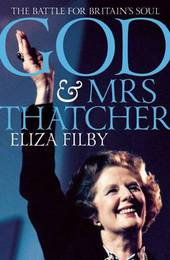
|
God and Mrs Thatcher: Conviction Politics in Britain's Secular Age
Hardback
Main Details
| Title |
God and Mrs Thatcher: Conviction Politics in Britain's Secular Age
|
| Authors and Contributors |
By (author) Eliza Filby
|
| Physical Properties |
| Format:Hardback | | Pages:352 | | Dimensions(mm): Height 234,Width 156 |
|
| Category/Genre | Christianity |
|---|
| ISBN/Barcode |
9781849547857
|
| Classifications | Dewey:941.0858092 |
|---|
| Audience | |
|---|
|
Publishing Details |
| Publisher |
Biteback Publishing
|
| Imprint |
Biteback Publishing
|
| Publication Date |
20 February 2015 |
| Publication Country |
United Kingdom
|
Description
This wide-ranging and extensively researched book, which draws on previously undiscovered archives, interviews and memoirs, offers a radical new perspective on the interrelationship between religion and politics in Britain's secular age, revealing how Britain created Margaret Thatcher and, ultimately, how Margaret Thatcher recreated Britain. Few people are aware that Margaret Thatcher was a devout Christian or that she was a preacher before she was a politician. As a child, she would sit in the pews listening to her lay-preacher father, Alf Roberts, hammer home sermons on the Protestant work ethic, God-given liberty and the sanctity of the individual. As her father's archives reveal, it was in the pulpit of Finkin Street's Wesleyan Chapel in Grantham where Thatcherism was born. When Thatcher recited the prayer of St Francis of Assisi on the steps of No 10, it signaled a new era of conviction politics.
Author Biography
Dr Eliza Filby is an academic, writer and businesswoman. Born on the night of the Brixton riots in south London, she is, by default, one of Thatcher's children. She regularly appears in the media, acting as a historical commentator for BBC News, Sky News and Radio 4 and has written for the Daily Telegraph, The Spectator, Standpoint and The Tablet. God and Mrs Thatcher is her first book. She lives in London.
Reviews[A] thoroughly researched and thoughtful study. John Campbell, The Independent
|